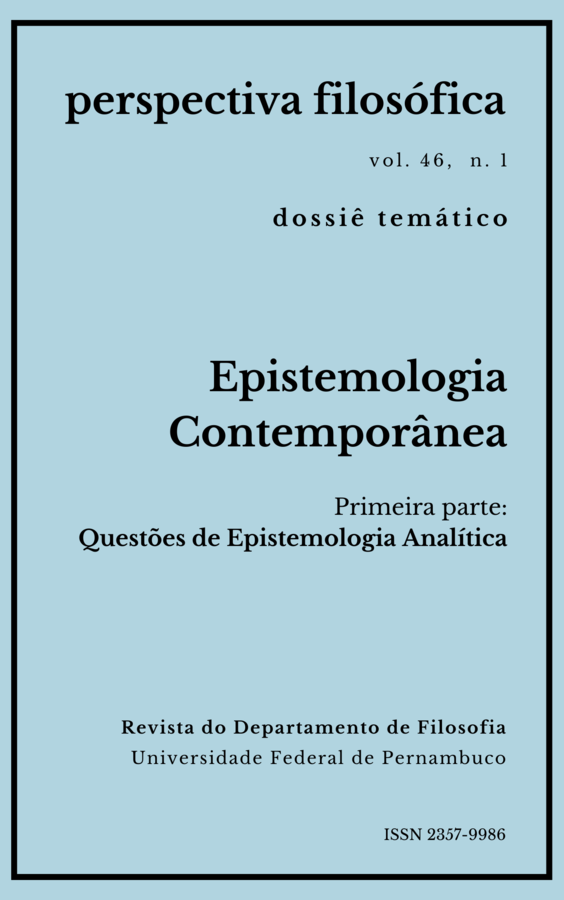O argumento do conhecimento: uma nova estratégia fisicista
DOI:
https://doi.org/10.51359/2357-9986.2019.247941Palavras-chave:
argumento do conhecimento, estratégia dos conceitos fenomenais, conteúdos não-conceituaisResumo
Neste artigo, apresento e defendo uma versão alternativa à chamada estratégia dos conceitos fenomenais em defesa do materialismo tipo B no clássico argumento do conhecimento de Jackson. Endossando a crítica de Ball e Tye à estratégia dos conceitos fenomenais, argumento em favor das seguintes teses. Primeira tese: o conteúdo recém-adquirido por Mary é de natureza nãoconceitual à luz de todos critérios disponíveis. Segunda tese: aquisição por Mary de tal conteúdo é justamente o que os permite explicar, ao menos em parte, tanto o seu progresso epistêmico (uma vez liberta do seu confinamento) quanto o incremento da sua expertise relativa ao seu antigo conceito VERMELHO FENOMENAL. Entretanto, embora a aquisição de tal conteúdo não-conceitual seja indispensável, ele são é suficiente para a explicação do progresso epistêmico realizado Mary. Terceira tese, assumindo que conceitos seja arquivos mentais, após a realização das experiências visuais de vermelho pela primeira vez, tal conteúdo não-conceitual recém-adquirido passa por um processo de “digitalização” para, assim, poder ser armazenado no arquivo mental VERMELHO FENOMENAL. Quarta e última tese: é com base nesse conceito de VERMELHO FENOMENAL, agora enriquecido fenomenalmente pelos recém-adquiridos conteúdos não-conceituais, que Mary se torna capaz de identificar o caráter fenomenal da sua nova experiência visual da cor vermelha mediante introspecção da sua experiência visual de vermelho.Referências
ALTER, Torin. Social externalism and the knowledge argument.Mind, v.122, n. 486, p. 481-496, 2013.
BACH, Kent. Thought and reference. 1987.
BLOCK, Ned. Max Black’s objection to mind-body identity.Oxford studiesin metaphysics, v. 3, p. 3-78, 2006.
BLOCK, Ned; STALNAKER, Robert. Conceptual analysis, dualism, andthe explanatory gap.The Philosophical Review, v. 108, n. 1, p. 1-46, 1999.
BURGE, Tyler. Individualism and the Mental.Midwest studies inphilosophy, v. 4, n. 1, p. 73-121, 1979.
BURGE, Tyler; HAHN, Martin; RAMBERG, Bjørn T. (Ed.).Reflectionsand replies: Essays on the philosophy of Tyler Burge. MIT press, 2003.
CARRUTHERS, Peter. Phenomenal concepts and higher order‐experiences.Philosophy and Phenomenological Research, v. 68, n. 2, p.316-336, 2004.
CHALMERS, David J.The character of consciousness. Oxford: OxfordUniversity Press, 2010.
DRETSKE, Fred I. Seeing and knowing. Chicago: University of ChicagoPress. 1969.DRETSKE, Fred I.Naturalizing the mind. Cambridge, MA: MIT Press,1997.
DRETSKE, Fred. Knowledge and the Flow of Information. Cambridge,MA: MIT Press, 1981.
EVANS, Gareth. The Varieties of Reference. Oxford: Oxford UniversityPress, 1982.
HILL, Christopher S. Imaginability, conceivability, possibility and the mind-body problem.Philosophical Studies: An International Journal forPhilosophy in the Analytic Tradition, v. 87, n. 1, p. 61-85, 1997.
HORGAN, Terence. Jackson on physical information and qualia.ThePhilosophical Quarterly (1950-), v. 34, n. 135, p. 147-152, 1984.
ISMAEL, Jenann. Science and the phenomenal.Philosophy of Science, v.66, n. 3, p. 351-369, 1999.
JACKSON, Frank. Epiphenomenal qualia.The Philosophical Quarterly(1950-), v. 32, n. 127, p. 127-136, 1982.
LEVINE, Joseph. eight Phenomenal Concepts and the Materialist Constraint.Phenomenal concepts and phenomenal knowledge: New essayson consciousness and physicalism, p. 145, 2006.
LEVINE, Joseph. Materialism and qualia: The explanatory gap.Pacificphilosophical quarterly, v. 64, n. 4, p. 354-361, 1983.LEVINE, Joseph.Purple haze: The puzzle of consciousness. Oxford:Oxford University Press, 2001.
LOAR, Brian. Phenomenal States. Philosophical Perspectives. v. 4, p. 81-108. 1990.
LUPYAN, Gary. Cognitive penetrability of perception in the age ofprediction: Predictive systems are penetrable systems.Review of philosophyand psychology, v. 6, n. 4, p. 547-569, 2015.
NAGEL, Thomas. What is it like to be a bat?.The philosophical review, v.83, n. 4, p. 435-450, 1974.
NIDA-RÜMELIN, Martine; O CONAILL, Donnchadh. Qualia: Theknowledge argument. 2002.
O'DEA, John. The indexical nature of sensory concepts.PhilosophicalPapers, v. 31, n. 2, p. 169-181, 2002.
PAPINEAU, D. Phenomenal and perceptual concepts and the materialistconstraint.In: ALTER, T.; S. WALTER (Eds.). Phenomenal concepts andphenomenal knowledge: New essays on consciousness and physicalism, p.111-144, 2006.
PAPINEAU, David.Thinking about consciousness. Oxford: ClarendonPress, 2002.
PERRY, John. Knowledge, Possibility and Consciousness: The 1999 JeanNicod Lectures. Cambridge, MA: MIT Press, 2001.
PYLYSHYN, Zenon. Is vision continuous with cognition?: The case forcognitive impenetrability of visual perception.Behavioral and brainsciences, v. 22, n. 3, p. 341-365, 1999.
REY, Georges. A narrow representationalist account of qualitativeexperience.Philosophical perspectives, v. 12, p. 435-457, 1998.
STOLJAR, Daniel. Physicalism and phenomenal concepts.Mind &language, v. 20, n. 5, p. 469-494, 2005.
STURGEON, Scott. The epistemic view of subjectivity.The Journal ofPhilosophy,v. 91, n. 5, p. 221-235, 1994.
TYE, Michael. A theory of phenomenal concepts.Royal institute ofPhilosophy Supplements, v. 53, p. 91-105, 2003.
TYE, Michael. Consciousness Revisited: Materialism without PhenomenalConcepts. Cambridge, MA: MIT Press. 2009.
TYE, Michael. Knowing what it is like: The ability hypothesis and theknowledge argument.in Tye, M.,Consciousness, Color, and Content,Cambridge, MA: MIT Press, 2000.
TYE, Michael.Ten problems of consciousness: A representational theory ofthe phenomenal mind. Cambridge, MA: MIT Press, 1995.
Downloads
Publicado
Edição
Seção
Licença
A Revista Perspectiva Filosófica orienta seus procedimentos de gestão de artigos conforme as diretrizes básicas formuladas pelo Conselho Nacional de Desenvolvimento Científico e Tecnológico (CNPq). http://www.cnpq.br/web/guest/diretrizesAutores que publicam nesta revista concordam com os seguintes termos:
Os autores mantém os direitos autorais e concedem à revista o direito de primeira publicação, sendo o trabalho simultaneamente licenciado sob https://creativecommons.org/licenses/by/4.0/deed.pt_BR que permite o compartilhamento do trabalho com reconhecimento da autoria e publicação inicial nesta revista.
Os autores têm autorização para assumir contratos adicionais separadamente, para distribuição não-exclusiva da versão do trabalho publicada nesta revista, com reconhecimento de autoria e publicação inicial nesta revista (Consultar http://opcit.eprints.org/oacitation-biblio.html).

Esta revista está licenciada com uma Licença Creative Commons Atribuição 4.0 Internacional.













